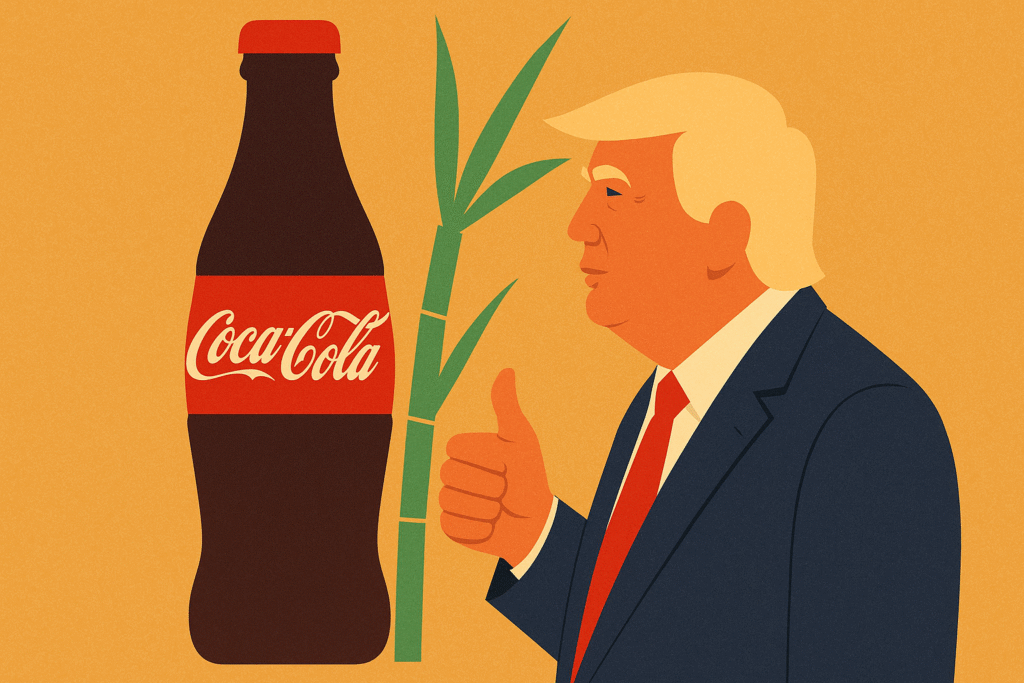In a surprising move that could have broad implications for the U.S. beverage and agricultural industries, former President Donald Trump announced on Wednesday that Coca-Cola will begin using cane sugar in its U.S. production of Coca-Cola beverages. The shift would mark a significant departure from the company’s long-standing reliance on high fructose corn syrup (HFCS), a widely used but controversial sweetener.
Trump made the announcement via a social media post, stating that he had spoken with Coca-Cola executives about the switch and that the company had “agreed to do so.” He called the decision “a good move,” adding: “You’ll see. It’s just better.”
The statement immediately stirred debate across the food and beverage sector and drew attention from industry stakeholders, policymakers, and health advocates. While Coca-Cola has yet to confirm the details of the switch, it acknowledged Trump’s interest in the brand and hinted at upcoming product innovations. “More details on new innovative offerings within our Coca-Cola product range will be shared soon,” the company said.
Industry Impact and Regional Tensions
The proposed shift could have significant economic consequences, particularly in the Midwest and Gulf Coast regions. HFCS, derived from corn, is a major product of Midwestern states like Iowa, Illinois, and Nebraska—regions that were critical to Trump’s electoral base. Replacing HFCS with cane sugar, which is primarily grown in Florida and Louisiana, could disrupt corn markets while benefiting sugarcane producers and foreign exporters under existing tariff quotas.
The announcement caused immediate ripples in the stock market. Shares of corn processing giants Archer Daniels Midland and Ingredion fell 6.3% and 8.9%, respectively, in after-hours trading Wednesday before recovering most of their losses Thursday. In contrast, Coca-Cola shares rose by 0.8%.
John Bode, CEO of the Corn Refiners Association, warned that such a move could harm American agriculture: “Replacing high fructose corn syrup with cane sugar would cost thousands of American food manufacturing jobs, depress farm income, and boost imports of foreign sugar — all with no nutritional benefit.”
A Broader Health and Policy Debate
Trump’s announcement also touches on a longstanding public health debate over added sugars. While many health advocates criticize HFCS for its alleged link to obesity and metabolic disorders, most scientific reviews suggest it carries similar health risks as table sugar when consumed in excess.
Coca-Cola has defended HFCS in public statements, describing it as “just a sweetener made from corn” with calorie content comparable to cane sugar.
The development aligns with a broader White House initiative to target highly processed foods. Health Secretary Robert F. Kennedy Jr. has led recent efforts to regulate artificial additives and excess sugar. Earlier this week, the administration announced that most U.S. ice cream producers had pledged to eliminate artificial colors from their products. Kennedy has called HFCS a threat but has also described sugar in general as “poison,” regardless of its source.
Historical Context
Coca-Cola used cane sugar in the U.S. until the 1980s before shifting to HFCS for cost and availability reasons. However, cane sugar remains the sweetener of choice in international markets like Mexico, where “Mexican Coke” made with sugar is a popular alternative among some American consumers. A special kosher version, available during Passover and sweetened with sugar, also enjoys niche popularity.
Whether Coca-Cola’s possible reformulation will replace or simply supplement its existing offerings remains unclear. What is certain, however, is that Trump’s unexpected involvement has reignited a national conversation about sugar, agriculture, and the influence of politics on consumer products.



